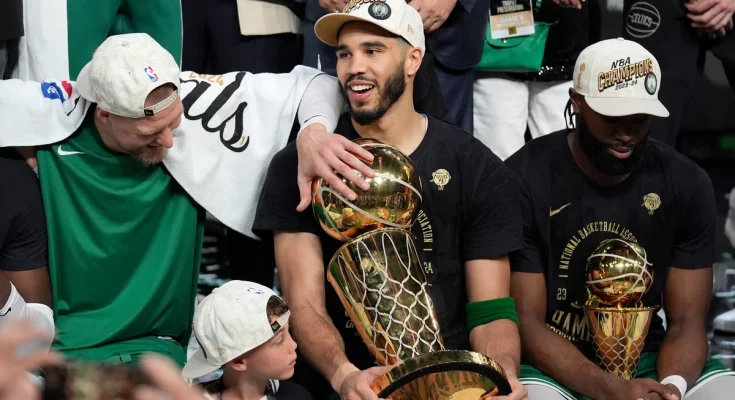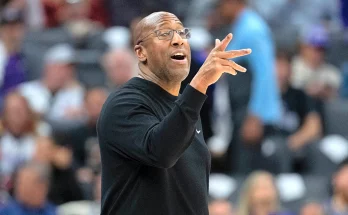The Boston Celtics, one of the most storied franchises in NBA history, have officially changed hands in a transaction that has sent shockwaves throughout the basketball world. The franchise, long synonymous with championships, legendary players, and an iconic fan base, has been sold to a consortium led by Bill Chisholm, a move that marks one of the most significant ownership changes in recent NBA history. While the financial terms of the deal are substantial, the implications for the team’s strategic direction, roster construction, and long-term vision may be even more profound. For decades, the Celtics have been a symbol of consistency and championship pedigree, and the arrival of a new ownership group introduces both excitement and uncertainty as the franchise enters a new chapter.
The history of the Boston Celtics is interwoven with the evolution of the NBA itself. Founded in 1946, the team quickly became a cornerstone of professional basketball, amassing a record number of championships and producing generations of iconic players. Figures such as Bill Russell, Larry Bird, Paul Pierce, and Kevin Garnett have left indelible marks on the franchise, creating a legacy of excellence and competitive ambition. Ownership over the years has played a critical role in sustaining this standard, with prior stewards ensuring both fiscal stability and a commitment to winning. The transition to a new consortium, led by Chisholm, represents the latest evolution in that ongoing stewardship. This sale is not merely a financial transaction; it is a signal of a potential shift in culture, strategy, and ambition, particularly as the NBA continues to evolve in an era defined by player empowerment, analytics-driven decision-making, and global market considerations.
Bill Chisholm, a figure known in financial and sports circles for his strategic acumen, brings to the Celtics a perspective that is as business-oriented as it is basketball-savvy. Chisholm’s leadership of the consortium indicates an emphasis on long-term growth, sustainable competitiveness, and brand expansion. The NBA has become an increasingly complex ecosystem where on-court success and off-court revenue are intertwined. Ownership groups now face pressures not only to assemble championship-caliber rosters but also to maximize global fan engagement, secure lucrative sponsorships, and leverage media rights in an evolving digital landscape. With Chisholm at the helm, the Celtics appear poised to embrace a model that balances these priorities while maintaining the franchise’s competitive ethos. Analysts have speculated that the new ownership could implement innovative approaches to player development, analytics integration, and international branding, all of which could further solidify the Celtics as a global sports powerhouse.
Financially, the sale of the Celtics is remarkable, reflecting both the team’s historic value and the broader escalation of NBA franchise prices. In recent years, the valuation of NBA teams has skyrocketed, driven by record-breaking media contracts, sponsorship deals, and international expansion of the league’s footprint. The Celtics, given their history and consistent competitive presence, are among the league’s most valuable franchises. While the exact financial terms of the sale have not been publicly disclosed, industry insiders suggest that the transaction falls within the upper echelon of recent NBA deals. This underscores not only the intrinsic value of the franchise but also the strategic importance of securing a seat at the table in one of the most commercially lucrative sports leagues in the world. For fans, the numbers may seem abstract, but the implications are concrete: new ownership could translate into increased investment in facilities, roster talent, and broader fan engagement initiatives.
The timing of this sale is also noteworthy within the context of the Celtics’ current competitive landscape. The team, in recent seasons, has positioned itself as a perennial contender in the Eastern Conference, boasting young stars who have begun to define the next era of Celtics basketball. With a talented roster anchored by Jayson Tatum and Jaylen Brown, the franchise is already in pursuit of another championship window. The infusion of new ownership and resources could accelerate the team’s trajectory, providing greater flexibility for player acquisitions, coaching staff investments, and technology-driven performance enhancements. Fans and analysts alike are watching closely to see whether Chisholm’s consortium will maintain the current strategic philosophy or introduce a transformative approach that reshapes the team’s identity in the years to come.
One of the most compelling aspects of this ownership transition is the potential impact on the Celtics’ culture and community presence. Historically, the franchise has been deeply intertwined with the city of Boston, representing not only a source of entertainment but also a civic institution with charitable initiatives, youth development programs, and community outreach. New ownership groups face the dual challenge of honoring these traditions while also pursuing growth in a rapidly changing sports marketplace. Chisholm’s consortium has signaled a commitment to preserving the franchise’s roots, indicating that local engagement and fan-centric initiatives will remain a priority. This balance between honoring heritage and embracing innovation could define the next chapter of Celtics basketball, creating opportunities for both on-court success and broader cultural influence.
From a strategic standpoint, the sale may also have ripple effects across the league. Ownership changes of this magnitude often prompt shifts in inter-team dynamics, trade strategies, and league governance. With the Celtics under new leadership, other franchises may reevaluate their competitive approaches, particularly in the Eastern Conference where Boston has historically been a dominant force. Additionally, the NBA Board of Governors will likely engage with the new consortium to ensure alignment on league policies, financial commitments, and long-term vision. In this sense, the sale is not simply a local or franchise-level event; it represents a development with league-wide ramifications that could influence competitive balance, collective bargaining considerations, and even future expansion initiatives.
For players, the arrival of a new ownership group introduces both opportunity and scrutiny. Professional athletes are acutely aware of how ownership philosophies can affect contract negotiations, roster decisions, and organizational culture. The Celtics’ young core and supporting roster will be monitoring how Chisholm’s consortium navigates these dynamics, particularly in terms of commitment to building around existing talent, investment in training and medical facilities, and willingness to pursue high-profile acquisitions. While the NBA has always been player-driven to some extent, ownership can materially influence both perception and reality, shaping the environment in which athletes operate and the trajectory of their careers.
Media and fan reaction to the sale has been swift and intense. News outlets across the country have highlighted the significance of the deal, emphasizing both the financial magnitude and the potential implications for championship contention. Social media platforms have amplified discussion, with fans debating whether new ownership will sustain the franchise’s winning culture or pursue bold, transformative changes. Analysts have also explored Chisholm’s prior ventures and leadership style, attempting to predict how his approach may influence decision-making in key areas such as drafting, free agency, and coaching hires. The narrative surrounding the sale is thus multi-dimensional, encompassing financial, cultural, competitive, and social considerations.
Looking ahead, the success of the Chisholm-led consortium will ultimately be measured by a combination of on-court performance, financial health, and fan engagement. NBA ownership is a high-stakes endeavor where decisions reverberate across multiple domains. The Celtics’ history sets a high bar, and expectations from fans, sponsors, and league officials will be intense. However, there is also tremendous opportunity. With a committed leadership team, ample resources, and a roster positioned for sustained competitiveness, the franchise is well-placed to continue its legacy while potentially embracing new innovations that could redefine excellence in professional basketball. The sale represents both a continuation of the Celtics’ storied narrative and the beginning of an exciting, uncharted chapter, where vision, strategy, and execution will determine how the team navigates the complex landscape of modern NBA competition.
In summary, the sale of the Boston Celtics to a Bill Chisholm-led consortium represents a historic moment for one of the NBA’s most iconic franchises. It is a transaction that carries financial magnitude, strategic significance, and cultural weight, offering the potential to reshape the team’s identity and trajectory in profound ways. From a historical perspective, it is a reminder of the enduring appeal and value of the Celtics brand, rooted in decades of success and tradition. From a strategic perspective, it highlights the evolving nature of NBA ownership, where business acumen, global branding, and analytics-driven decision-making are increasingly critical. As the consortium takes the reins, all eyes will be on Boston to see how this next chapter unfolds, balancing legacy with innovation, tradition with ambition, and local identity with global reach. Ultimately, the story of the Celtics under Chisholm’s leadership will be one of adaptation, foresight, and the relentless pursuit of excellence, as the franchise continues to define what it means to be a contender in the modern NBA.


